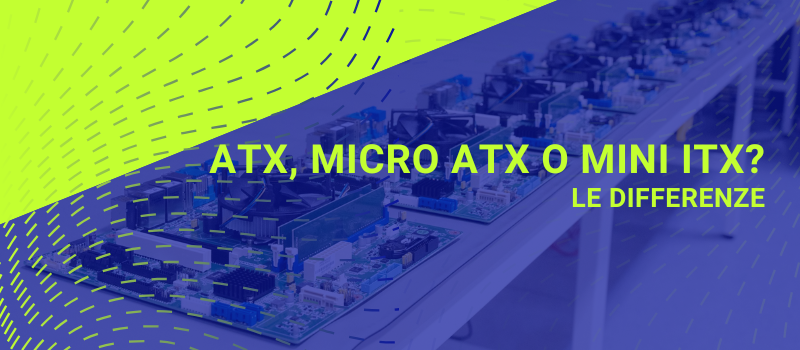
Published on November 9, 2022 - 00:00
ATX, Micro ATX or Mini ITX motherboard? The differences
Configuring an industrial PC requires selecting some main components, including the motherboard: the set of printed circuits that form the basis for installing all the hardware parts of a computer.
While installing a motherboard is not that complicated, choosing the most suitable motherboard is not as simple: the factors to evaluate include the size of the case, the type of power supply, the form factor and the RAM and PCI Express specifications.
Motherboards are in fact available in a wide variety of formats, of which the 3 most common are ATX, Micro ATX and Mini-ITX motherboards. But the difference between the 3 types is not limited to the physical size: let's compare ATX, Micro ATX and Mini ITX in detail.
ATX Motherboards: Features
ATX is an acronym developed by Intel, which stands for Advanced Technology Extended: a standard designed to ensure compatibility between all ATX-based components. The dimensions of ATX motherboards exceed those of Micro ATX and Mini ITX, measuring 305 x 244 mm or 12.0″ x 9.6”. In addition, an ATX motherboard can have from 4 to 8 RAM slots, with a maximum memory capacity of 512 GB.
As for PCI Express slots, ATX motherboards have the advantage of offering at least 3 PCIe, although some high-end models can have up to 5. Among the pros of an ATX motherboard we can therefore note a high number of PCIe slots, with the possibility of dual GPU, and more RAM than other motherboards. On the other hand, ATX boards tend to cost more and the chassis must be quite large.
Micro ATX motherboard: specifications
Always in line with the ATX standard, a Micro ATX motherboard has slightly smaller dimensions than an ATX motherboard: 244 x 244 mm or 9.6″ x 9.6″. Square in shape, Micro ATX motherboards typically have 4 RAM slots and support at least 64 GB, although some models can reach up to 128 GB. Micro ATX usually have only one PCIe slot, and only in some cases up to 3 slots.
Micro ATX is the type of motherboard that is generally cheaper and offers more, it is compatible with most cases and provides excellent memory performance. Among the disadvantages, however, we mention the limited expansion capacity, both RAM and PCIe.
Mini ITX format boards: the properties
The abbreviation ITX instead stands for Information Technology eXtended, a protocol developed by VIA Technologies that, in many ways, is similar to the Intel ATX standard. Mini ITX motherboards are the smallest of the 3 form factors, with compact dimensions of 170 x 170 mm or 6.7″ x 6.7″. They have one or two RAM slots and can accommodate up to 32 GB of memory, if configured in 2 x 16 GB RAM kits; they also offer only one PCI Express slot.
The ITX motherboard has the advantage of adapting to all cases on the market, allowing you to assemble a complete PC in small spaces; on the other hand, the presence of limited PCI Express slots and RAM does not make ITX motherboards suitable for overclocking.
ATX, Micro ATX and Mini ITX
ATX, Micro ATX and Mini ITX motherboards have different pros and cons, as well as being suitable for different uses. To make it easier to analyze ATX, Micro ATX and Mini ITX, discover the Digimax comparison table and explore the similarities and differences:
The choice of the motherboard depends on many factors, first of all the use that is made of it on the assembled computer: it is the decisive component especially in an industrial PC!
For this purpose, the Digimax experience can be for you: as expert distributors of components for Industrial PCs, you can find the motherboard best suited to your needs in a catalog of over 500 industrial motherboards, entirely configurable in form factors, sockets and chipsets, RAM modules, on-board peripherals, expansion buses and much more.
Contact Digimax for a consultation on motherboards and industrial PCs for automation!
Digimax is projected into the future and thanks to 30 years of experience in the world of industrial automation, it develops solutions that integrate reliable hardware with precise and detailed technical advice.
Digimax is your partner for the industrial automation of the future.